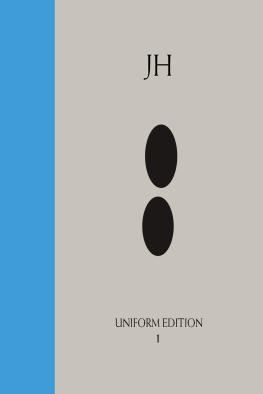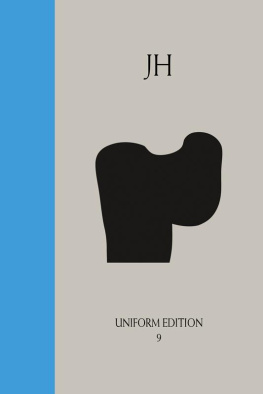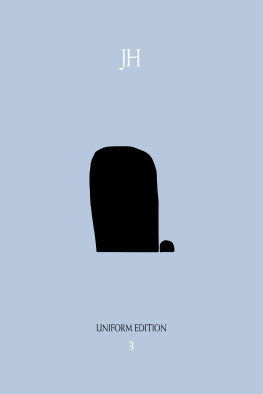James Hillman - Archetypal Psychology
Here you can read online James Hillman - Archetypal Psychology full text of the book (entire story) in english for free. Download pdf and epub, get meaning, cover and reviews about this ebook. year: 2013, publisher: Spring Pub, genre: Religion. Description of the work, (preface) as well as reviews are available. Best literature library LitArk.com created for fans of good reading and offers a wide selection of genres:
Romance novel
Science fiction
Adventure
Detective
Science
History
Home and family
Prose
Art
Politics
Computer
Non-fiction
Religion
Business
Children
Humor
Choose a favorite category and find really read worthwhile books. Enjoy immersion in the world of imagination, feel the emotions of the characters or learn something new for yourself, make an fascinating discovery.
- Book:Archetypal Psychology
- Author:
- Publisher:Spring Pub
- Genre:
- Year:2013
- Rating:4 / 5
- Favourites:Add to favourites
- Your mark:
- 80
- 1
- 2
- 3
- 4
- 5
Archetypal Psychology: summary, description and annotation
We offer to read an annotation, description, summary or preface (depends on what the author of the book "Archetypal Psychology" wrote himself). If you haven't found the necessary information about the book — write in the comments, we will try to find it.
Archetypal Psychology — read online for free the complete book (whole text) full work
Below is the text of the book, divided by pages. System saving the place of the last page read, allows you to conveniently read the book "Archetypal Psychology" online for free, without having to search again every time where you left off. Put a bookmark, and you can go to the page where you finished reading at any time.
Font size:
Interval:
Bookmark:

Uniform Edition of the Writings of James Hillman
Volume 1: Archetypal Psychology
Copyright 2015 Margot McLean
All rights reserved
ISBN 978-0-88214-999-8 (e-book edition, v. 2.5)
Published by Spring Publications, Inc.
www.springpublications.com
Originally published in Italian in 1981 as Psicologia archetipica, a chapter in Volume V of the Enciclopedia del Novecento. First published in English language as Archetypal Psychology: A Brief Account in 1983.
Revised and expanded fourth edition
Cover illustration:
James Lee Byars, Untitled, 1960. Black ink on Japanese paper. Estate of James Lee Byars; courtesy Michael Werner Gallery, New York, London, Berlin
The Uniform Edition of the Writings of James Hillman is published
in conjunction with Dallas Institute Publications,
Joanne H. Stroud, Director
The Dallas Institute of Humanities and Culture
an integral part of its publications program concerned with the imaginative, mythic, and symbolic sources of culture.
Additional support for this publication has been provided by
The Fertel Foundation
and by the
Pacifica Graduate Institute and Joseph Campbell Archives and Library.
Prefatory Note
JAMES Hillman prefaced the first English edition of Archetypal Psychology: A Brief Account, published in 1983, with the following note:
This monograph was written during the autumn of 1979 at the request of the lstituto dellEnciclopedia ltaliana for inclusion in Volume V of the Enciclopedia del Novecento, published in 1981, where it can be read in the Italian translation of Bianca Garufi. Her assiduous attention helped these condensed formulations find their final expression. Though I feel ambivalent about these sorts of abbreviations, it seemed to me that since it was out in translation, why not in the original. For this first publication in English, I have made scarcely any revisions, neither bringing the literature up to date (other than a few insertions), nor enumerating the directions archetypal psychology has taken in various hands since 1979, nor reporting on lectures, conferences, meetings. Developments move so quickly that the fantasy of keeping up to date is misplaced.
Rather, this essay serves merely to locate archetypal psychology as a topic of thought presented in the style of an encyclopedia of the twentieth century.
Since its first publication, Archetypal Psychology: A Brief Account has been republished several times. For the 1997 edition, the bibliography of sources and works in the field of archetypal psychology, patiently compiled by Thomas Cheetham, was significantly expanded. The list of Hillmans published writings was revised and cross-referenced with meticulous attention by Joan Luster. Further revisions to the list were made in 2004, when Archetypal Psychology became the first volume of the Uniform Edition of the Writings of James Hillman.
Shortly after the publication of the 2004 edition, the complete list of Hillmans writings contained in Archetypal Psychology was published online as part of the James Hillman Collection in the Opus Archives and Research Center, where it is freely accessible at www.opusarchives.org/hillman_bibliography.shtml .
In early 2011, Hillman requested that in the next edition the list of his writings be removed (since it is now maintained online at Opus), and three additional texts be included instead, which he felt belonged in this introductory account of archetypal psychology: Why Archetypal Psychology?; Psychology: Monotheistic or Polytheistic?; and Psychology: Monotheistic or Polytheistic? Twenty-Five Years Later.
Wherever possible, bibliographical references have been updated to the most recent editions and translations, and some relevant works published after 2004 have also been added.
Klaus Ottmann
PART ONE
A Brief Account
Sources of Archetypal Psychology
ARCHETYPAL Psychology, first named as such by James Hillman (1970 b ), had from its beginning the intention of moving beyond clinical inquiry within the consulting room of psychotherapy by situating itself within the culture of Western imagination. It is a psychology deliberately affiliated with the arts, culture, and the history of ideas, arising as they do from the imagination. The term archetypal, in contrast to analytical, which is the usual appellation for Jungs psychology, was preferred not only because it reflected the deepened theory of Jungs later work that attempts to solve psychological problems beyond scientific models (Hillman 1970 b ); it was preferred more importantly because archetypal belongs to all culture, all forms of human activity, and not only to professional practitioners of modern therapeutics. By traditional definition, archetypes are the primary forms that govern the psyche. But they cannot be contained only by the psyche, since they manifest as well in physical, social, linguistic, aesthetic, and spiritual modes. Thus, archetypal psychologys first links are with culture and imagination rather than with medical and empirical psychologies, which tend to confine psychology to the positivistic manifestations of the nineteenth-century condition of the soul.
Archetypal psychology can be seen as a cultural movement, part of whose task is the re-visioning of psychology, psychopathology, and psychotherapy in terms of the Western cultural imagination. In an early review of the field and an examination of its main thrusts, Goldenberg (1975) regards archetypal psychology as a third generation derivative of the Jungian school in which Jung is recognized as the source but not the doctrine. Two themes of its directions, which she singles out the emphasis upon psychopathology and the radical relativization and desubstantiation of the ego will be discussed below.
It is without doubt that the first immediate father of archetypal psychology is Carl Gustav Jung, the Swiss psychologist (b. 1875; d. 1961). James Hillman, Rafael Lpez-Pedraza, Patricia Berry, Paul Kugler, Murray Stein, Adolf Guggenbhl-Craig, Bianca Garufi, Robert Grinnell, and many others of the authors referred to below were trained as Jungian analysts. (However, a significant number of other authors mentioned e.g., David L. Miller, Edward S. Casey, Gilbert Durand, Nor Hall, Mary Watkins, Robert Sardello did not receive this specific Jungian formation and contribute to archetypal psychology from phenomenology, literature, poetry, philosophy, religious studies, etc.) From Jung comes the idea that the basic and universal structures of the psyche, the formal patterns of its relational modes, are archetypal patterns. These are like psychic organs, congenitally given with the psyche itself (yet not necessarily genetically inherited), even if somewhat modified by historical and geographical factors. These patterns or archai appear in the arts, religions, dreams, and social customs of all peoples, and they manifest spontaneously in mental disorders. For Jung, they are anthropological and cultural, and also spiritual in that they transcend the empirical world of time and place and, in fact, are in themselves not phenomenal. Archetypal psychology, in distinction to Jungian, considers the archetypal to be always phenomenal (Avens 1980), thus avoiding the Kantian idealism implied in Jung (de Voogd 1977).
The primary, and irreducible, language of these archetypal patterns is the metaphorical discourse of myths. These can therefore be understood as the most fundamental patterns of human existence. To study human nature at its most basic level, one must turn to culture (mythology, religion, art, architecture, epic, drama, ritual) where these patterns are portrayed. The full implication of this move away from biochemical, socio-historical, and personal-behavioristic bases for human nature toward the imaginative has been articulated by Hillman as the poetic basis of mind. Support for the archetypal and psychological significance of myth, besides the work of Jung, comes from Ernst Cassirer, Karl Kernyi, Erich Neumann, Heinrich Zimmer, Gilbert Durand, Joseph Campbell, Ginette Paris, and David L. Miller.
Font size:
Interval:
Bookmark:
Similar books «Archetypal Psychology»
Look at similar books to Archetypal Psychology. We have selected literature similar in name and meaning in the hope of providing readers with more options to find new, interesting, not yet read works.
Discussion, reviews of the book Archetypal Psychology and just readers' own opinions. Leave your comments, write what you think about the work, its meaning or the main characters. Specify what exactly you liked and what you didn't like, and why you think so.












